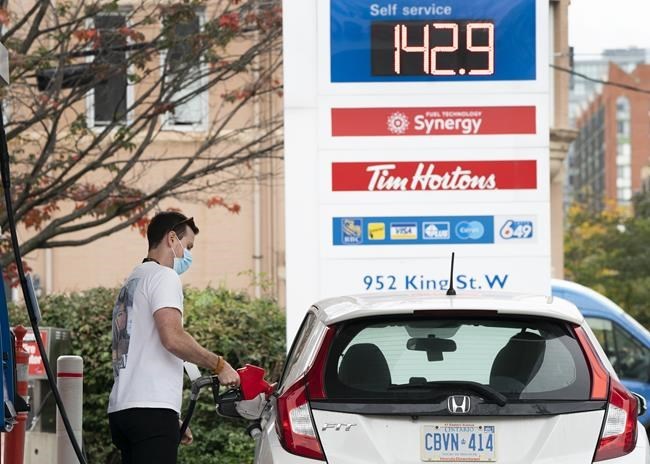CALGARY — The delivery team at Flower Chix typically puts in 300 to 400 km a day on the road, delivering fresh floral arrangements around Calgary and the surrounding area.
That means that even in normal times, gasoline is no small part of this small independent florist shop's budget. When gas prices spike to all-time records, like they did across Canada this week, the impact on the business is significant.
"I would say we've seen our gas costs go up by about $200 to $300 a month," said Flower Chix owner Monique Britten. “I am actually looking for either an electric or a hybrid vehicle right now for the shop, and that’s pretty much a direct result of the cost of the deliveries, including gas."
From coast to coast this fall, businesses that have already dealt with surging prices on everything from heating to building supplies to labour are now facing a new headwind — the price at the pump.
Data from Natural Resources Canada, which tracks fuel prices across the country, shows the average weighted national retail price for regular gasoline in Canada hit $1.45 per litre this week. That's up more than 40 cents year-over-year and the highest weekly average price on record, according to fuel price consultancy firm Kalibrate, which has data all the way back to 2007.
The gasoline price spike is leading to higher shipping and inventory delivery costs for businesses of all types. And for those for whom driving is part of the job — everyone from food delivery gig workers to cab drivers to realtors — high fuel prices are a direct hit to the bottom line.
“As a real estate agent, you are a sole proprietor or self-incorporated. So those are your expenses to pay," said Jared Chamberlain, broker-owner of Chamberlain Real Estate Group in Calgary.
"I'd say 90 per cent of our team is doing between 20 and 30,000 km a year on their cars. And there's really nothing we can do about it."
Corinne Pohlmann, senior vice-president of national affairs for the Canadian Federation of Independent Business, said businesses will pass rising input costs along to customers when they can. But in many cases, like when a small business is competing on price with a larger competitor, that's just not an option.
The result, Pohlmann said, is that many Canadian businesses are facing inflationary pressures at a time when they are still trying to emerge from the challenges of the COVID-19 pandemic.
"Unfortunately, it is making it difficult — at an already difficult time — for small businesses to rebound," Pohlmann said.
But it's not all bad news, said Pedro Antunes, chief economist with The Conference Board of Canada. The majority of the gasoline price increase is being driven by the price of crude oil, which is at seven-year highs due to increased demand globally as pandemic restrictions ease and economic activity picks up.
"We still think that for Canada as a whole, (high gasoline prices) are slightly positive," Antunes said. "And that's because it lifts profits, specifically in the three oil-producing provinces of Alberta, Saskatchewan and Newfoundland."
If energy companies in those provinces reinvest the cash flow from higher prices into new projects and hiring, the result will be economic growth for the country. But it's unclear just how much oil and gas companies will be willing to spend and hire after seven years of depressed prices, Antunes said.
The potential economic gains also don't negate the impact of higher gasoline prices on individual consumers and businesses.
"We're a low-density and widespread economy, so it does cause us pain," Antunes said. "We're going to see the implications of higher gasoline prices eroding our purchasing power."
This report by The Canadian Press was first published October 8, 2021.
Amanda Stephenson, The Canadian Press



